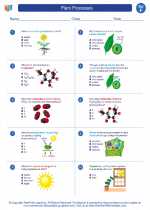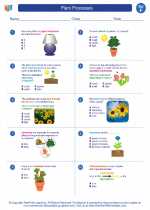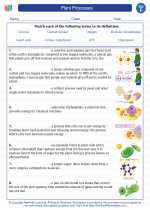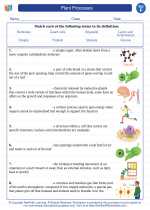Plant Processes -> fluid balance
Fluid Balance
Fluid balance refers to the proper distribution of water and electrolytes in the body to maintain homeostasis. The human body is made up of approximately 60% water, and maintaining the right balance of fluids is crucial for various physiological processes. When the body loses more fluid than it takes in, dehydration can occur, while an excess of fluid can lead to conditions such as edema.
Factors Affecting Fluid Balance
- Fluid Intake: This includes drinking water and consuming fluids through food and beverages.
- Fluid Loss: This can occur through urine, sweat, breathing, and bowel movements.
- Electrolyte Balance: Electrolytes such as sodium, potassium, and chloride play a crucial role in fluid balance.
- Hormonal Regulation: Hormones like antidiuretic hormone (ADH) and aldosterone help regulate fluid balance by controlling urine production and electrolyte levels.
Importance of Fluid Balance
Fluid balance is essential for various bodily functions, including:
- Transporting Nutrients: Fluids help transport nutrients and oxygen to cells and remove waste products from the body.
- Regulating Body Temperature: Sweating helps cool the body, while adequate fluids help maintain normal body temperature.
- Supporting Organ Function: Fluids are essential for the proper functioning of organs such as the kidneys, which filter waste from the blood.
- Maintaining Blood Pressure: Proper fluid balance is crucial for regulating blood volume and blood pressure.
Study Guide
Here are some key points to remember when studying fluid balance:
- Define fluid balance and its significance in the human body.
- Identify the factors that affect fluid balance, including fluid intake, fluid loss, electrolyte balance, and hormonal regulation.
- Explain the importance of fluid balance in transporting nutrients, regulating body temperature, supporting organ function, and maintaining blood pressure.
- Discuss the potential consequences of imbalances in fluid levels, such as dehydration and edema.
- Understand the role of hormones in regulating fluid balance, including antidiuretic hormone (ADH) and aldosterone.
Understanding fluid balance is crucial for maintaining overall health and well-being. It is important to be mindful of fluid intake and to recognize the signs of imbalances to prevent potential health issues.
[Fluid Balance] Related Worksheets and Study Guides:
.◂Science Worksheets and Study Guides Sixth Grade. Plant Processes

 Activity Lesson
Activity Lesson
 Worksheet/Answer key
Worksheet/Answer key
 Worksheet/Answer key
Worksheet/Answer key
 Worksheet/Answer key
Worksheet/Answer key
 Worksheet/Answer key
Worksheet/Answer key
 Vocabulary/Answer key
Vocabulary/Answer key
 Vocabulary/Answer key
Vocabulary/Answer key
